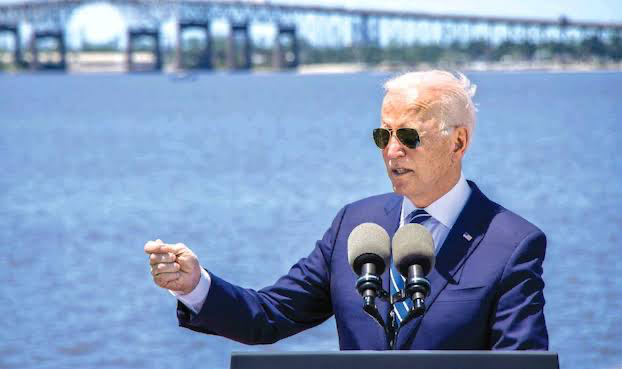The US president, Joe Biden, has announced a pause on approvals for new liquefied natural gas (LNG) export terminals, a move that has been welcomed by climate activists but criticized by some allies and industry groups.
Biden said on Friday that his administration would conduct a review of the economic and environmental impacts of LNG exports, which have surged in recent years as the US became the world’s top producer and exporter of the fuel.
“During this period, we will take a hard look at the impacts of LNG exports on energy costs, America’s energy security, and our environment,” Biden said in a statement.
He added that the pause “sees the climate crisis for what it is: the existential threat of our time.”
The decision came after pressure from environmentalists and youth groups, who have been protesting against new LNG projects, arguing that they harm local communities, lock in global reliance on fossil fuels, and contribute to emissions of greenhouse gases, especially methane.
According to the International Energy Agency (IEA), methane emissions from the oil and gas sector accounted for about 18% of the total human-caused emissions of the gas in 2020.
The IEA has also warned that there is no room for new fossil fuel projects if the world is to limit global warming to 1.5 degrees Celsius above pre-industrial levels, as agreed in the 2015 Paris climate accord.
Biden, who rejoined the Paris agreement on his first day in office, has pledged to cut US greenhouse gas emissions by 50-52% by 2030 and achieve net-zero emissions by 2050.
Implications for allies and industry
The pause on LNG exports could have implications for US allies, especially in Europe and Asia, who rely on the fuel for their energy security and transition away from coal and nuclear power.
The US exported about 11.4 billion cubic feet per day (bcfd) of LNG in 2023, up from 6.5 bcfd in 2020, according to the US Energy Information Administration. The main destinations were Japan, China, South Korea, India, and the European Union.
The Biden administration said the pause would not hurt allies, as it has an exemption for national security emergencies. A spokesperson for the European Commission said the pause “will not have any short- to medium-term impacts on the EU’s security of supply.”
However, some industry groups and Republican lawmakers said the decision was a blow to US energy leadership and a boon for rival exporters, such as Russia and Qatar.
“President Biden’s decision to halt LNG exports is a gift to Vladimir Putin and a slap in the face to our allies,” said Kevin McCarthy, the Republican leader in the House of Representatives.
The American Petroleum Institute, a trade group, said the pause “undermines US energy security and global leadership on emissions reductions.”
Only four projects with export approvals pending at the Department of Energy (DOE) would be affected by the pause, an administration official said. The projects could include ones by Sempra Infrastructure, Commonwealth LNG, and Energy Transfer, the DOE’s website showed.
A milestone for climate lawsuits
More than two dozen local and state governments in the US are suing oil companies for damages related to climate change, while youth plaintiffs have seven pending lawsuits against state and federal lawmakers.
One of the most prominent cases is Juliana v. United States, which was filed in 2015 by 21 young Americans who accused the federal government of violating their constitutional rights by causing and failing to act on climate change.
The case has faced several legal hurdles and attempts to dismiss it by both the Trump and Biden administrations. Last week, the Biden administration filed a motion indicating it aims to have the case dismissed.
However, climate advocates are hopeful that the courts will recognize the urgency and legitimacy of their claims, especially after a landmark ruling in Montana last year.
In August 2023, a judge ruled in favor of young Montana residents who claimed the state’s pro-fossil fuel policies violated their right to a clean and healthy environment. The state appealed the ruling to Montana’s supreme court, which said it would review the case this year.
“We might look back and say 2024 is the year that climate lawsuits took off,” said Richard Wiles, president of the Center for Climate Integrity, a non-profit that tracks and supports climate complaints.
A year of exponential climate action
The pause on LNG exports is part of a broader push for exponential climate action in 2024, a crucial year for the implementation of the Paris Agreement and the achievement of the 2030 goals.
The COP26 climate summit in Glasgow last year endorsed the IEA’s net-zero roadmap, which also calls for an end to new fossil fuel projects and a phase-out of coal-fired power plants.
To make this happen, governments, businesses, investors, civil society, and citizens need to work together and scale up their ambition and action, while ensuring a just and inclusive transition for all.
As the UN secretary-general, Antonio Guterres, said: “It’s not game over – it’s game on.”
Source: Reuters



